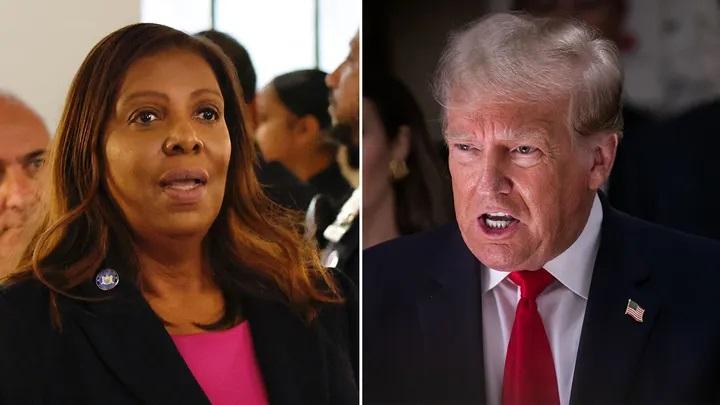Closing arguments in the non-jury civil trial stemming from New York Attorney General Letitia James’ lawsuit against former President Trump and his business empire are expected to be delivered Thursday.
The trial began in October, after James sued Trump, his family and his business empire claiming he inflated his financial statements and deceived banks.
Trump and his family have denied any wrongdoing. The former president has repeatedly said his assets were actually undervalued. Trump has repeatedly said his financial statements had disclaimers, requesting that the numbers be evaluated by the banks.
Closing arguments are set to begin at 10 a.m. ET. It is unclear if Trump will be present for the proceedings.
Judge Arthur Engoron on Wednesday rescinded the court’s offer for Trump to deliver his own closing argument in the case Thursday.
Engoron had initially approved the request for Trump to make his own closing statement, but said the former president would be required to limit his remarks to “commentary on the relevant, material facts that are in evidence, and application of the relevant law to those facts.”
Engoron said Trump would be prohibited from introducing new evidence or commenting on “irrelevant matters” and said he could not “deliver a campaign speech” or speak ill of court staff or the attorney general.
However, Trump attorney Chris Kise, in an email to Engoron, said Trump has “been wrongfully demeaned and belittled by an out of control, politically motivated Attorney General” and he should be allowed to “speak about the things that must be spoken about.”
Kise also requested to postpone closing arguments, citing the death of Trump’s mother-in-law, Amalija Knavs, whom Kise said Trump “was very close to.”
Former first lady Melania Trump made the announcement about her mother’s passing on X late Tuesday.
Engoron said he was “sorry to hear the sad news,” but denied the request.
Engoron went on to impose a deadline for Kise to agree, on behalf of Trump, to abide by his rules for the closing argument — a deadline Kise missed.
“Not having heard from you by the third extended deadline (noon today), I assume that Mr. Trump will not agree to the reasonable, lawful limits I have imposed as a precondition to giving a closing statement above and beyond those given by his attorneys, and that, therefore, he will not be speaking in court tomorrow,” Engoron wrote in an email Wednesday.
James filed the lawsuit against Trump “under a consumer protection statute that denies the right to a jury,” a Trump spokesperson told.
“There was never an option to choose a jury trial,” the spokesperson said. “It is unfortunate that a jury won’t be able to hear how absurd the merits of this case are and conclude no wrongdoing ever happened.”
James is seeking more than $370 million from Trump and his family, claiming the funds would be repayment for the profits she claims were illicitly gained.
Back in September, Engoron ruled that Trump and the Trump Organization had committed fraud while building his real estate empire, by deceiving banks, insurers and others, by overvaluing his assets and exaggerating his net worth on paperwork used in making deals and securing financing.
“He ruled against me without knowing anything about me,” Trump said on the stand during the trial. “He called me a fraud, and he didn’t know anything about me.”
Throughout the trial, Trump attorneys brought witnesses, like former Deutsche Bank top executives, who testified the banks sought additional business from Trump, who they viewed as a “whale of a client.”
Trump’s defense also brought in expert witnesses, like New York University accounting professor Eli Bartov, who reviewed the Trump financial statements at issue in the case and said he found no evidence of accounting fraud.
Bartov testified last month that Trump’s financial statements didn’t violate accounting principles, and he suggested that anything problematic — like a huge year-to-year leap in the estimated value of his Trump Tower penthouse — was simply an error.
“My main finding is that there is no evidence whatsoever of any accounting fraud,” Bartov testified. Trump’s financial statements, he said, “were not materially misstated.”
